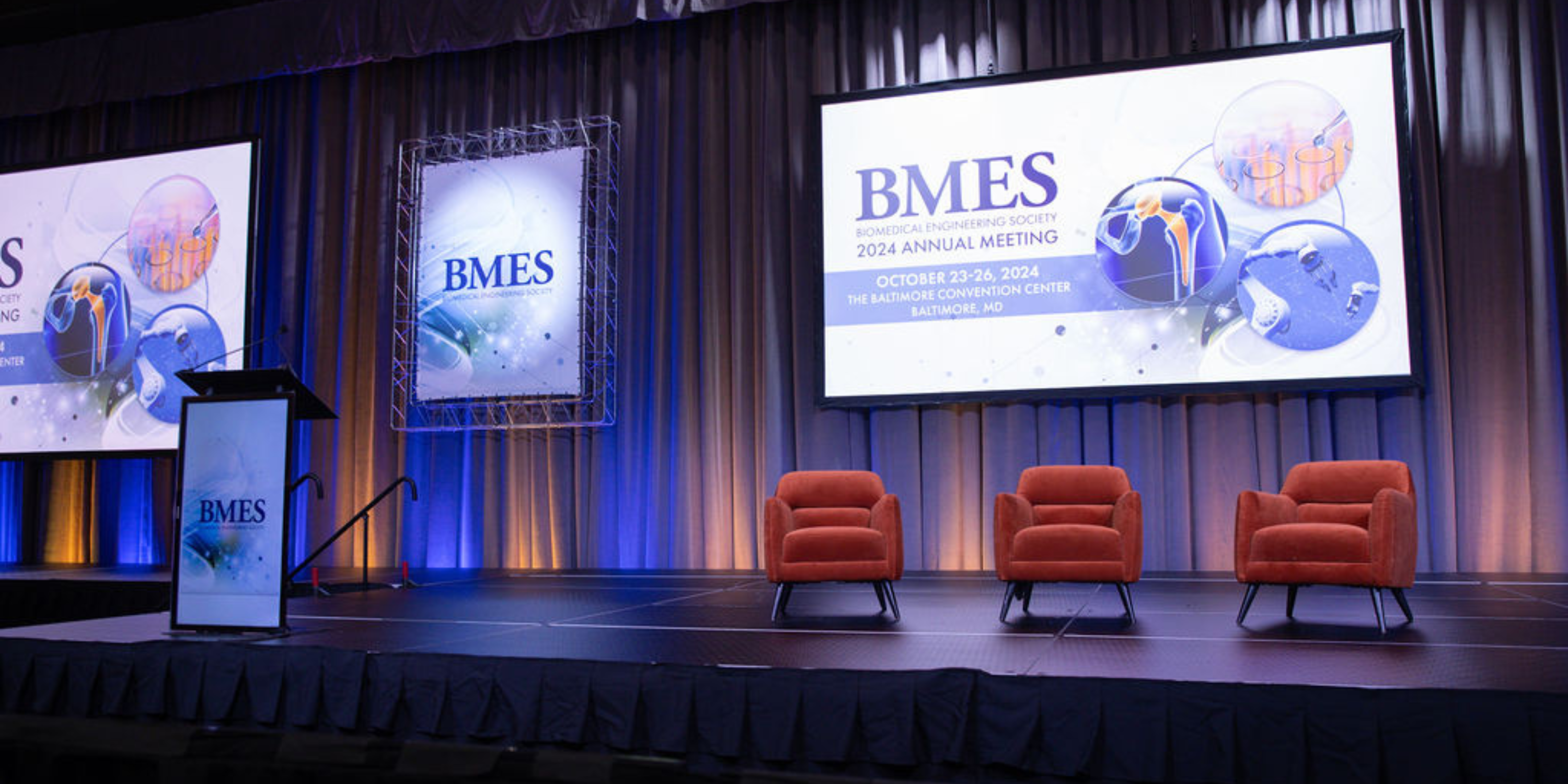Extending the Abstract Submission Deadline and 2025 Annual Meeting Highlights
Because we understand the complexity of this year’s funding and travel uncertainty, we are extending the abstract submissions deadline for this...
BMES serves as the lead society and professional home for biomedical engineers and bioengineers. BMES membership has grown to over 6,700 members, with more than 110+ BMES Student Chapters, three Special Interest Groups (SIGs), and four professional journals.
Welcome to the BMES Hub, a cutting-edge collaborative platform created to connect members, foster innovation, and facilitate conversations within the biomedical engineering community.
Discover all of the ways that you can boost your presence and ROI at the 2024 BMES Annual Meeting. Browse a range of on-site and digital promotional opportunities designed to suit any goal or budget that will provide maximum impact.
This is the sixth and final article in a series highlighting some of the technologies, processes and keynote plenary sessions presented at the 2024 Annual Meeting of the Biomedical Engineering Society, October 2024.
When investigators think of applying for NIH research funding, they typically have grants, cooperative agreements, and contracts in mind. Yet NIH also utilizes another approach to generate solutions from a broad, diverse range of researchers— challenges (a.k.a. prize competitions).
Challenges are a way of tapping into the wisdom of the crowd to generate a perhaps unanticipated range of possible solutions to biomedical and behavioral science problems identified by NIH, C. Taylor Gilliland, Ph.D., formerly the Senior Advisor for Innovation Programs at the National Institute of Biomedical Imaging and Bioengineering (NIBIB), told attendees at this year’s BMES meeting.
While NIH prizes can bring substantial rewards — the median prize purse is $100,000 but others have ranged into the millions—they do come with a catch: participants in a challenge often have to use their own resources to compete and take on the risk of not winning. NIH structures some challenges in stages so that participants can compete for prizes at multiple points throughout the program.
Challenges also have significantly lower administrative requirements than are usually associated with NIH grants. Instead of writing a lengthy proposal for future research to receive funding, challenge participants typically must show how they have successfully accomplished specific objectives set by NIH.
The number of challenges and prize money have risen sharply. NIH launched 22 new challenges offering nearly $18 million in cash prizes in fiscal year 2024. Since NIH obtained prize competition authority in 2011, NIH has launched 130 challenges offering $84.3 million in prizes. Nearly all NIH Institutes and Centers have sponsored or co-sponsored a challenge and three out of five NIH challenges have involved another federal or non-federal partner.
Dr. Gilliland shared how the National Institute of Biomedical Imaging and Bioengineering (NIBIB) is leveraging its Rapid Acceleration of Diagnostics Technology (RADx® Tech) program in conjunction with the challenge approach to speed innovation in the development of medical diagnostics and devices. RADx Tech was launched in April 2020 to establish a robust pipeline of point-of-care and home-based COVID-19 diagnostic tests and reduce the time needed to bring these diagnostics to market from years to months. So far, the program has helped more than 60 diagnostic test platforms and test products obtain FDA authorization. RADx Tech accomplished this through a combination of funding and provision of wrap-around subject-matter expert support in topics ranging from validation and manufacturing to clinical implementation and regulatory.
Building on this technology accelerator approach, NIH launched RADx Tech for Maternal Health, an $8 million competition to accelerate the development of postpartum maternal health diagnostics in September 2022. The goal is to improve health outcomes among individuals during the first year following delivery with an emphasis on those who live in “maternity care deserts,” regions with limited to no access to maternal health care. Pregnant and postpartum individuals residing in these areas are likely to experience higher rates of illness and death from cardiovascular disease, cardiomyopathy, hemorrhage, sepsis, and mental health issues. Potential solutions might include anything from wearable devices and smartphone-enabled diagnostic tools to sensors and at-home specimen diagnostics.
Competitors in the RADx Tech for Maternal Health Challenge first provided a description of their technology, a proposed commercialization plan, and any evidence to demonstrate proof of concept. Within a couple of months, the initial viability assessment of the proposals was completed and 15 innovators were awarded $20,000 each and advanced to the next stage of the challenge.
Phase 2 involved a “deep dive” assessment where a team of experts evaluated the potential for each diagnostic technology to improve postpartum maternal health outcomes. This involved meeting with each innovator team and going into the details of their device and their plans for further development. Ten teams with promising technologies then received $75,000 each and advanced to the third and final phase of the challenge. Throughout this technology assessment phase, the innovator teams met regularly with an industry veteran who helped them identify and mitigate potential risks to commercial development and clinical deployment.
Those teams then shipped their prototype devices for independent testing to the RADx Validation Center, which is run by a collaboration between Children’s Healthcare of Atlanta, Emory University School of Medicine and Georgia Institute of Technology for benchtop validation and small-scale clinical studies.
RADx Tech for Maternal Health announced the six grand prize winners (winning $525,000 each) and two runners-up (winning $300,000 each) in October, just two years after the contest began. Winning technologies included a wearable cardiovascular health monitor, a point-of-care diagnostic for post-partum hemorrhage, a rapid home test for urinary infections, a smartphone app to detect anemia, and a remote point-of-care vital signs monitor. Some of the products have already received FDA clearance for broader clinical testing.
Following on the model of the maternal health challenge, NIH partnered with the Gates Foundation to launch the $2 million RADx Tech Fetal Monitoring Challenge in September 2023. The RADx Tech Fetal Monitoring Challenge sought out devices that could monitor such markers as blood acidity and oxygen saturation, placental perfusion, fetal heart rate, and inflammation. Six innovators competed in the final phase of the challenge and the winners were announced recently.
The RADx Tech Advancing Cures and Therapies and ending ENDOmetriosis diagnostic delays (ACT ENDO) Challenge is offering $3 million in prizes to improve the diagnosis of endometriosis, an often-undetected condition where fetal tissue grows outside the uterus.
The $9.8 million Neuromod Prize seeks to accelerate the use of peripheral nerve stimulation to independently regulate two or more autonomic functions without unintended consequences. The four Phase 2 winners include two university research teams, a biomedical startup, and an individual investigator.
The $6 million TARGETED Challenge funds delivery systems for in vivo genome editing. One track involves delivering gene editors to at least three different types of cells or tissue. The second track involves non-viral editors that can cross the blood-brain barrier.
NIH also sponsors the annual challenge Design for Biomedical Undergraduate Teams (DEBUT), open to undergraduate students only. As in the past 12 years, winners were announced at this year’s BMES annual meeting. DEBUT 2025 is expected to start accepting submissions in January with a deadline of May 30. For more information and to see past winners visit https://www.nibib.nih.gov/programs/division-interdisciplinary-training-didt/debut.
Going forward, NIH has nine active challenges with deadlines running through June 2, 2025.
To learn more about NIH’s prize challenge programs, check out www.challenge.gov.

Because we understand the complexity of this year’s funding and travel uncertainty, we are extending the abstract submissions deadline for this...

Open Editor-in-Chief Positions for BMES Journals: Biomedical Engineering Education (BMEE) Cardiovascular Engineering and Technology (CVET)

Want to make an impact? As a CDR reviewer, you’ll evaluate submissions from student chapters and help determine which ones deserve top recognition....

This is three in a series of articles highlighting some of the technologies, processes and keynote plenary sessions presented at the 2024 Annual...

This is the fourth in a series of articles highlighting some of the technologies, processes and keynote plenary sessions presented at the 2024...

We’re looking forward to seeing you in Baltimore, MD., on October 23-26 for #BMES2024.